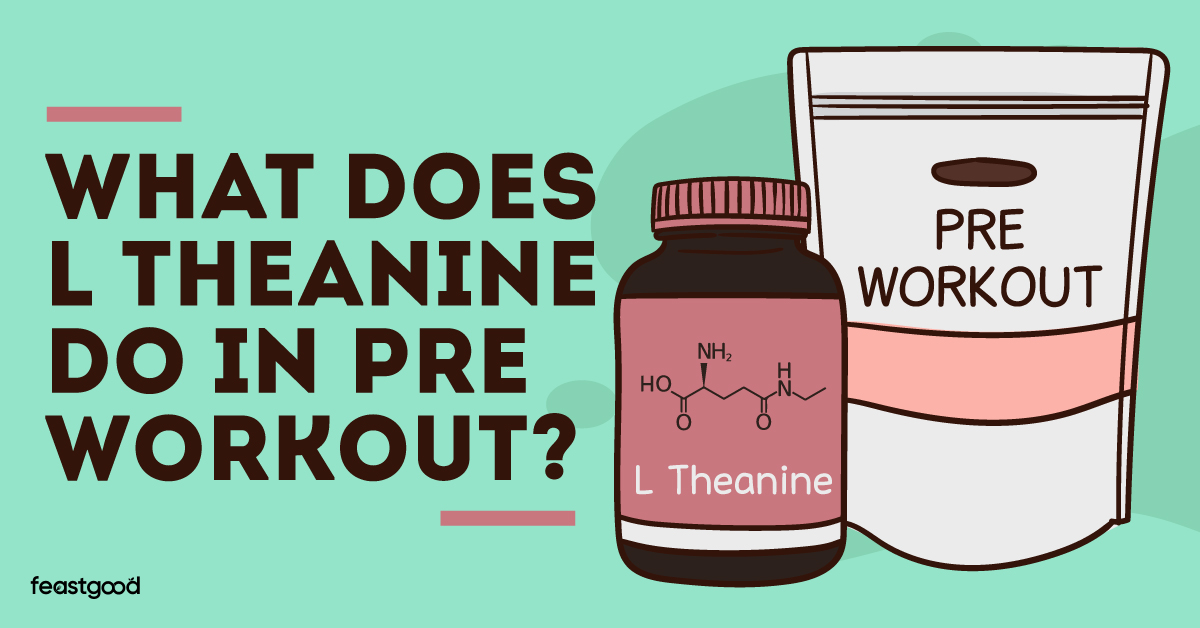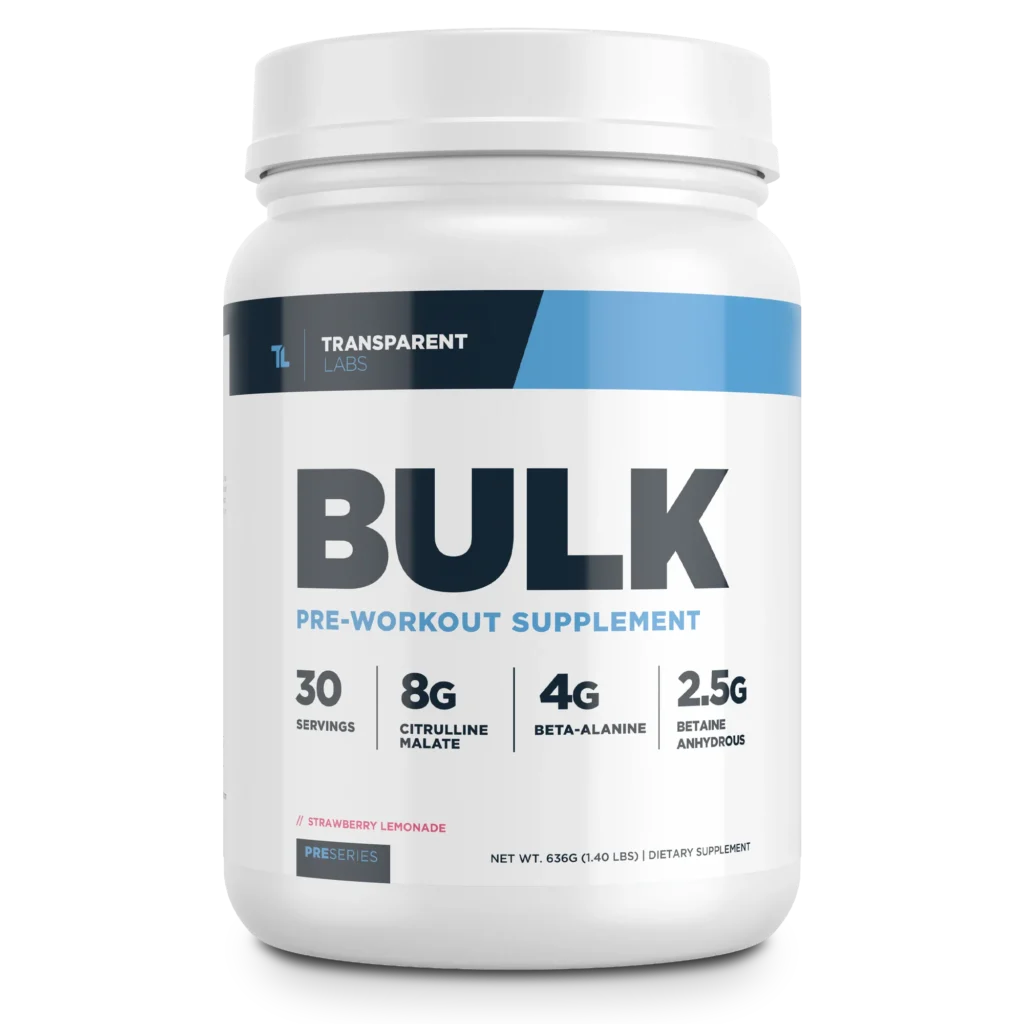Some links in this article are affiliate links, which means we earn from qualifying purchases. Learn more.
You might wonder if L-Theanine in pre-workouts is beneficial for your training. As a dietitian, I will explain the benefits and use cases for L-theanine so that you know exactly what you’re getting when purchasing supplements.
Key Takeaways
- L-Theanine works by influencing brain activity, improving concentration, and reducing stress. It activates alpha brain waves, encouraging relaxation and potentially lowering cortisol (stress hormone) levels.
- Pairing L-theanine with caffeine further enhances cognitive performance, making it valuable for sports performance and demanding tasks requiring sustained attention.
- A standard dose of L-theanine is 100-200 mg per serving, and it is most effective when taken 30-60 minutes before exercise.
What Is L-Theanine?
L-Theanine is an amino acid variant predominantly found in green and black tea, imparting a savory taste.
It is also available in higher doses in supplements created by extracting it from tea or chemically synthesizing it.
L-Theanine is known for its calming effects and potential to improve mental alertness.
Its impact on cognitive function has made it an ingredient of interest among athletes and pre-workout manufacturers.
How Does L-Theanine Work?
L-Theanine works primarily in the brain, impacting concentration, reducing stress, and encouraging relaxation. Some research suggests it also improves immune responses, reducing the vulnerability of the immune system that occurs with intense training.
When ingested, L-theanine enters the bloodstream, crosses the blood-brain barrier, and alters brain activity by enhancing the activation of alpha brain waves.
Alpha waves are one of the five types of waves produced in the brain. When they are activated, it means that the brain isn’t fully relaxed, but it’s not engaged in any demanding or focused tasks either.
Think about when you wake up in the morning, when you meditate, or when your brain is relaxed. This state of being produces these so-called alpha waves.
According to researchers, more Alpha wave activity indicates relaxation in the brain and lower cortisol (stress hormone) levels, which could positively impact daily life and exercise performance.
- Related Article: Explaining 27+ Pre-Workout Ingredients & What They Do
The Benefits Of L-Theanine For Exercise Performance
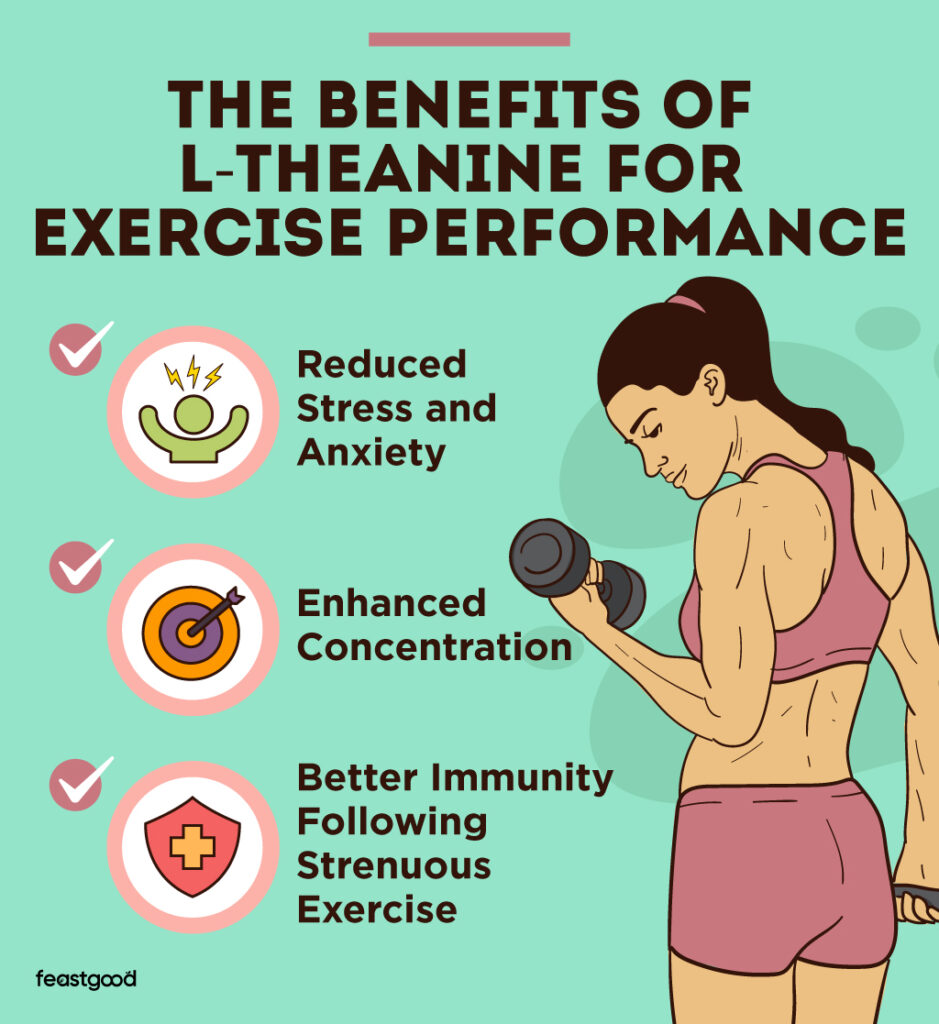
The benefits of L-theanine for exercise performance include:
1. Reduced Stress And Anxiety
Competitive athletes often face intense training regimens and competitive pressures, leading to elevated stress levels. L-theanine supplements may benefit athletes by potentially reducing stress and anxiety.
A large study looked at how L-theanine affects stress and anxiety when taken as a supplement. They examined nine studies, and the results suggest that taking 200-400 mg of L-theanine daily might help reduce stress and anxiety in people facing stressful situations.
However, the review highlights the need for more and more extensive studies, including those where L-theanine is regularly part of the diet, to confirm its effectiveness as a therapeutic agent for daily stress and anxiety.
2. Enhanced Concentration
L-theanine can be particularly advantageous in sports that require quick decision-making and sustained attention to technique, like football, hockey, tennis, and weightlifting.
L-theanine’s ability to reduce stress and anxiety helps athletes think more clearly and focus on the task at hand.
One small study investigated the effects of L-theanine and caffeine on cognitive performance and alertness in healthy young subjects. The doses used were 97 mg of L-theanine and 40 mg of caffeine.
Combining these two ingredients showed improved accuracy during task switching, increased alertness, and reduced tiredness, suggesting a potential role in boosting attention and focus during challenging cognitive activities.
The pairing of L-theanine with caffeine may seem strange, but I’ll explain why combining them is beneficial later.
3. Better Immunity Following Strenuous Exercise
Enhanced immunity through L-theanine supplementation might be particularly advantageous for athletes engaged in strenuous physical exercise. Intense training can temporarily weaken the immune system, making athletes more susceptible to infections.
One small-scale study investigated L-theanine supplementation in elite athletes (rowers) exposed to strenuous physical exercise. This study showed L-theanine had beneficial effects on the immune system.
More specifically, it showed a reduction in the concentration of Interleukin-10, an immune system suppressor.
The reduction of this immune suppressor suggests that those supplementing with L-theanine are more resistant to sickness during hard training than those who don’t supplement. That said, more research is required to confirm these findings.
Are There Any Side Effects Of L-Theanine In Pre Workout?
There are no reported side effects of L-theanine taken alone or in pre-workout supplements, but research thus far is insufficient and inconclusive.
Based on the current literature, no adverse side effects have been observed, even at higher supplementation doses (450–900 mg daily for eight weeks).
However, it’s worth mentioning that the same cannot be said for those drinking tea as those supplementing. Consuming green tea in excess can cause an upset stomach, insomnia, or irritability due to its caffeine content.
As a reminder, a daily safe amount of caffeine for adults is 400 mg (less for women during pregnancy/breastfeeding).
To put this into context, one 8-ounce (230-ml) cup of green tea contains 30-50 mg of caffeine, brewed coffee contains around 95 mg of caffeine, and a serving of pre-workout has 150-300 mg.
How To Properly Use L-Theanine In Your Pre Workout Routine
L-theanine can be purchased separately to enhance your pre-workout, or you can get a pre-workout containing L-theanine. I’ll share my top product picks later on.
Dose
There are no standard recommendations for a clinical L-theanine dosage; however, the standard dose is 100-200 mg.
Current research suggests the following doses for the associated benefits:
- 200-400 milligrams per day for acute stress reduction.
- 100 milligrams per day for cognitive performance if paired with caffeine (according to the recommendations of the ISSN of 3–6 milligrams per kilogram of body mass).
Timing
To reap the benefits of L-theanine, take it about 30-60 minutes before exercise. However, precise timing depends on whether you take it with other ingredients like caffeine.
“The most commonly used timing of caffeine supplementation is 60 min pre-exercise.”
– International Society of Sports Nutrition.
If you want to combine L-theanine with caffeine, consider taking both 60 minutes before exercise to allow caffeine time to reach peak effects.
Use Cases
Here are some examples of how to include L-theanine based on the desired effects:
- Calming effect: Add 200mg of L-theanine to 100ml of water or juice 30 minutes before a workout.
- Improved focus and alertness: Add 100-200mg of L-theanine to a caffeinated drink (e.g., brewed coffee) around 60 minutes before the gym.
- Improved focus and performance enhancement: Choose a multi-ingredient pre-workout supplement containing 100-200mg of L-theanine. Take it according to the suggested use on the label.
Pre-Workouts That Have A Clinical Dose of L-Theanine
Here are my top product recommendations that contain effective doses of L-theanine.
Transparent Labs Bulk Pre-Workout
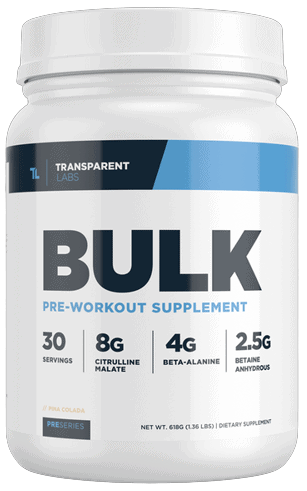
The best pre-workout product containing L-theanine is Transparent Labs’ Bulk Pre Workout Supplement. With one scoop, you can get 200 mg of L-theanine, an effective dose according to current literature.
This pre-workout also contains caffeine, beta-alanine, and taurine, which help to increase alertness, delay fatigue, and improve strength and power.
Read our complete Transparent Labs Bulk Review.
Single Ingredient: BulkSupplements L-Theanine Powder
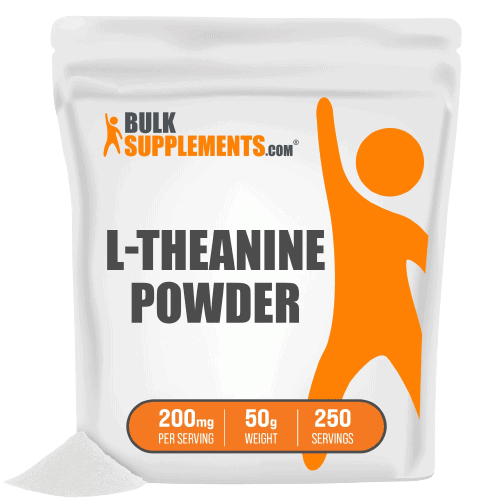
If you want to purchase L-theanine to make your own pre-workout cocktail, I recommend BulkSupplements L-Theanine Powder.
One scoop of this supplement offers 200 mg of L-theanine. Add this to water or juice (minimum 50ml) per the suggested usage.
Myths and Misconceptions About L-Theanine
The main misconception about L-theanine is that it causes drowsiness because of its calming effects, leading people to believe they shouldn’t take it before a workout.
The reality is that L-theanine promotes relaxation, not drowsiness. It helps to reduce resting heart rate without causing sedation, contributing to improved focus and stress reduction, which can aid in sports performance.
What Is L-Theanine Usually Combined With?
L-Theanine is frequently combined with caffeine (more precisely, 97–100 mg of L-theanine and 40-50 mg of caffeine).
This pairing is popular due to reported improvements in alertness, focus, and cognitive function during demanding tasks.
These ingredients complement one another because caffeine enhances alertness but can also cause jitteriness and anxiety, impacting one’s ability to focus.
L-theanine’s calming effects are thought to reduce the negative effects of caffeine so that the user can be alert and focused.
What Are Natural Sources of L-Theanine?
L-theanine is found in certain food products. Natural sources of L-theanine include tea, mainly green and black tea, and certain mushrooms.
A serving of 250 mL of green tea, brewed according to instructions, contains around 8-30 mg of L-theanine.
You would need to consume between 6 and 25 cups of green tea to get around 200 mg of L-theanine.
The downside of choosing natural sources of L-theanine over supplementation is that you have to be mindful of your caffeine intake, which should be at most 400 mg daily.
Frequently Asked Questions
Do You Have To Cycle L-Theanine?
The evidence for using L-theanine is based on short-term studies (over a few weeks), and the need to cycle L-theanine has yet to be investigated. You can do this if you take L-Theanine regularly and want to take breaks from it.
Does L-Theanine Expire?
Yes, L-theanine can expire. Look at the expiration date on the package, and follow the guidelines on the label for storage and use. Using it after it expires may impact its efficacy.
Can You Take L-Theanine Every Day?
Yes, you can take L-Theanine daily, and it is generally considered safe as no known side effects have been found in the short term. Many people take it regularly to support relaxation and focus. If considering it for long-term daily use, discuss it with a clinician first to ensure it is right for you.
Should I Take L-Theanine Before Caffeine?
You can take L-theanine at any time of the day, before or with caffeine. If you aim to improve cognitive performance before a demanding task or activity (e.g., a competition), take it with caffeine around 60 minutes before the event (per research protocols).
Does L-Theanine Cancel Out Caffeine?
No, L-Theanine does not cancel out caffeine. In fact, this combination might work better for concentration than caffeine alone by enhancing cognitive function and promoting concentration and attention without excessive stimulation.
Can You Get Addicted To L-Theanine?
There is no evidence suggesting dependence on L-Theanine. It is generally considered safe for regular short-term use. If you want to take it long-term and are unsure whether this supplement is for you, speak to a healthcare professional.
Learn About Other Supplements
References
Williams JL, Everett JM, D’Cunha NM, Sergi D, Georgousopoulou EN, Keegan RJ, McKune AJ, Mellor DD, Anstice N, Naumovski N. The Effects of Green Tea Amino Acid L-Theanine Consumption on the Ability to Manage Stress and Anxiety Levels: a Systematic Review. Plant Foods Hum Nutr. 2020 Mar;75(1):12-23. doi: 10.1007/s11130-019-00771-5. PMID: 31758301.
Juszkiewicz A, Glapa A, Basta P, Petriczko E, Żołnowski K, Machaliński B, Trzeciak J, Łuczkowska K, Skarpańska-Stejnborn A. The effect of L-theanine supplementation on the immune system of athletes exposed to strenuous physical exercise. J Int Soc Sports Nutr. 2019 Feb 15;16(1):7. doi: 10.1186/s12970-019-0274-y. PMID: 30770758; PMCID: PMC6377763.
Daneman R, Prat A. The blood-brain barrier. Cold Spring Harb Perspect Biol. 2015 Jan 5;7(1):a020412. doi: 10.1101/cshperspect.a020412. PMID: 25561720; PMCID: PMC4292164.
Evans M, McDonald AC, Xiong L, Crowley DC, Guthrie N. A Randomized, Triple-Blind, Placebo-Controlled, Crossover Study to Investigate the Efficacy of a Single Dose of AlphaWave® L-Theanine on Stress in a Healthy Adult Population. Neurol Ther. 2021 Dec;10(2):1061-1078. doi: 10.1007/s40120-021-00284-x. Epub 2021 Sep 25. PMID: 34562208; PMCID: PMC8475422.
Giesbrecht T, Rycroft JA, Rowson MJ, De Bruin EA. The combination of L-theanine and caffeine improves cognitive performance and increases subjective alertness. Nutr Neurosci. 2010 Dec;13(6):283-90. doi: 10.1179/147683010X12611460764840. PMID: 21040626.
Iyer SS, Cheng G. Role of interleukin 10 transcriptional regulation in inflammation and autoimmune disease. Crit Rev Immunol. 2012;32(1):23-63. doi: 10.1615/critrevimmunol.v32.i1.30. PMID: 22428854; PMCID: PMC3410706.
Sarris, J., Byrne, G. J., Cribb, L., Oliver, G., Murphy, J., Macdonald, P., … Ng, C. H. (2019). L-theanine in the adjunctive treatment of generalized anxiety disorder: A double-blind, randomized, placebo-controlled trial. Journal of Psychiatric Research, 110, 31-37. https://doi.org/10.1016/j.jpsychires.2018.12.014
Guest NS, VanDusseldorp TA, Nelson MT, Grgic J, Schoenfeld BJ, Jenkins NDM, Arent SM, Antonio J, Stout JR, Trexler ET, Smith-Ryan AE, Goldstein ER, Kalman DS, Campbell BI. International society of sports nutrition position stand: caffeine and exercise performance. J Int Soc Sports Nutr. 2021 Jan 2;18(1):1. doi: 10.1186/s12970-020-00383-4. PMID: 33388079; PMCID: PMC7777221.
Kimura, K., Ozeki, M., Juneja, L. R., & Ohira, H. (2007). l-Theanine reduces psychological and physiological stress responses. Biological Psychology, 74(1), 39-45. https://doi.org/10.1016/j.biopsycho.2006.06.006
Owen GN, Parnell H, De Bruin EA, Rycroft JA. The combined effects of L-theanine and caffeine on cognitive performance and mood. Nutr Neurosci. 2008 Aug;11(4):193-8. doi: 10.1179/147683008X301513. PMID: 18681988.
About The Author

Giulia Rossetto is a qualified Dietitian and Nutritionist. She holds a Masters in Human Nutrition (University of Sheffield, UK) and more recently graduated as a Dietitian (University of Malta). Giulia aims to translate evidence-based science to the public through teaching and writing content. She has worked 4+ years in clinical settings and has also published articles in academic journals. She is into running, swimming and weight lifting, and enjoys spending time in the mountains (she has a soft spot for hiking and skiing in the Italian Dolomites).
Why Trust Our Content

On Staff at FeastGood.com, we have Registered Dietitians, coaches with PhDs in Human Nutrition, and internationally ranked athletes who contribute to our editorial process. This includes research, writing, editing, fact-checking, and product testing/reviews. At a bare minimum, all authors must be certified nutrition coaches by either the National Academy of Sports Medicine, International Sport Sciences Association, or Precision Nutrition. Learn more about our team here.
Have a Question?
If you have any questions or feedback about what you’ve read, you can reach out to us at [email protected]. We respond to every email within 1 business day.
